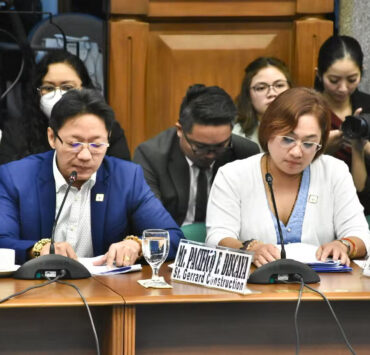Young Guns, old tricks

The ink has barely dried on the Supreme Court ruling that spared Vice President Sara Duterte from an impeachment trial this year, and already a band of neophyte lawmakers is rushing to rewrite the 1987 Constitution.
But their motive appears driven less by principle than by sheer panic.
Instead of building a credible opposition to challenge the country’s No. 2 official in 2028, the so-called Young Guns bloc in the House is peddling Charter change (Cha-cha) as a shortcut for boosting a prospective rival to the potential front-runner.
Last week, Deputy Speakers Paolo Ortega V (La Union) and Jay Khonghun (Zambales); Deputy Majority Leaders Zia Alonto Adiong (Lanao del Sur) and Rodge Gutierrez (1-Rider); and Cagayan de Oro Rep. Lordan Suan and Cebu Rep. Eduardo Rama filed Resolution of Both Houses No. 2, which sought to cut the age thresholds from 40 to 35 for president and vice president, and from 35 to 30 for senators.
Under-30 demographic
If adopted by both chambers, the resolution would pave the way for a constitutional convention where elected delegates can formally propose the amendments, which will then be submitted to a plebiscite for ratification. Said Ortega: “[It’s] high time … for a more collaborative type of government to be led by fresh and bright minds.”
“Even in the local government, there are already a lot of good up-and-comers. [There] are a lot of young and bright public servants who are nontraditional,” he said.
The proposal reads like a legitimate, if a little idealistic, call to “allow younger Filipinos—who are more globally competitive, socially aware, and capable of national leadership” to take on higher national posts. After all, more than half of the population is under 30, a demographic the resolution describes as “vibrant, dynamic, and increasingly educated.”
But the timing of this move, coming on the heels of the Supreme Court decision and surveys showing Duterte supposedly tightening her grip on the 2028 presidential race, betrays its true intent. Pasig City Mayor Vico Sotto, who will be 39 by 2028, one year shy of the current age requirement, has been floated as the possible beneficiary of this constitutional mangling.
Speculative surveys
A Tangere survey recently claimed that Sotto would statistically tie with former president Rodrigo Duterte’s daughter if he were allowed to run, drawing 34 percent support nationwide in the baseline scenario. An earlier poll by WR Numero had placed the Vice President in the lead, though by a slimmer margin than before.
But here’s the rub: Why are our lawmakers treating these premature and largely speculative surveys as gospel? Neither Tangere nor WR Numero is in the league of more established pollsters like Social Weather Stations or Pulse Asia, and even the latter two could hardly give a credible snapshot of the elections three years from now. And history has shown that surveys taken three years before an election are about as reliable as a barber’s tale. Recall that President Marcos himself was a distant second to Duterte in such polls before he won by a landslide in 2022, with the VP likewise victorious as his running mate.
All these tell us that opening Pandora’s box of Charter change to accommodate a hypothetical scenario based on untested surveys is pure folly. For one, there is the ever-present risk of wholesale constitutional revision and term extensions under the guise of modernization. For another, it reduces constitutional change—an extraordinary and consequential act—to the level of petty politicking.
Electoral machinations
Worse, it signals that the House is willing to gamble with the nation’s fundamental law for the sake of electoral machinations. Lowering the age threshold will not solve the opposition’s crisis of leadership. If anything, it cheapens the cause of youth participation by turning it into a partisan tool. It certainly does no favors to rising local executives like Sotto to be the product of political conspiracy rather than of genuine public trust.
“By opening the highest offices to leaders as young as 35, we give the Filipino people a chance to be led by the energy and creativity of the youth, ready to carry the nation forward,” the Young Guns said.
But if these young lawmakers truly want to empower the youth, their first order of business must be to deliver honest governance and equal opportunities for public service. Tampering with the Constitution for partisan purposes runs counter to the democratic values they claim to espouse.
History offers a cautionary tale: Other presidents have tried to ride the Cha-cha train and ended up squandering political capital. Would the Marcos administration take the same perilous road?
The Constitution is not a plaything to be bent as an overreaction to unfavorable polls nor in the interest of partisan schemes. If even traditional politicians failed, what makes the Young Guns believe the same old tricks can fool the electorate?

















